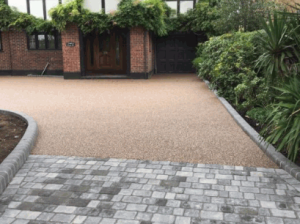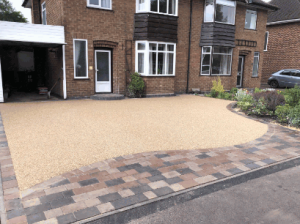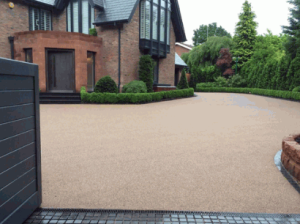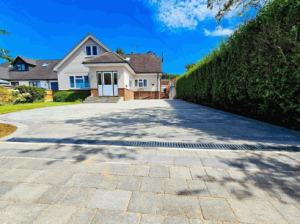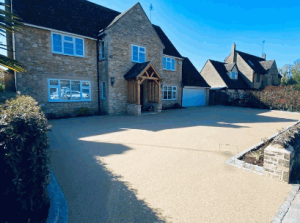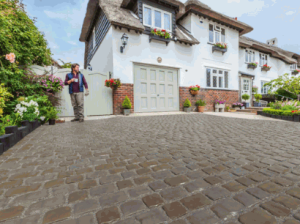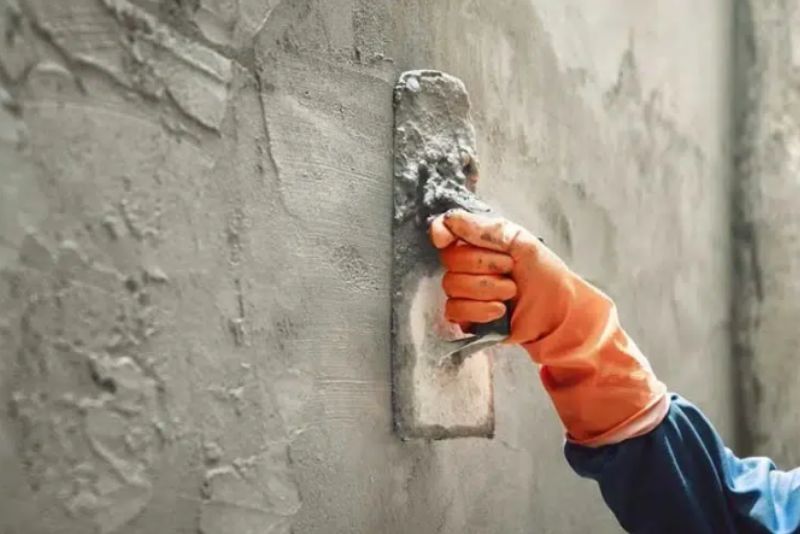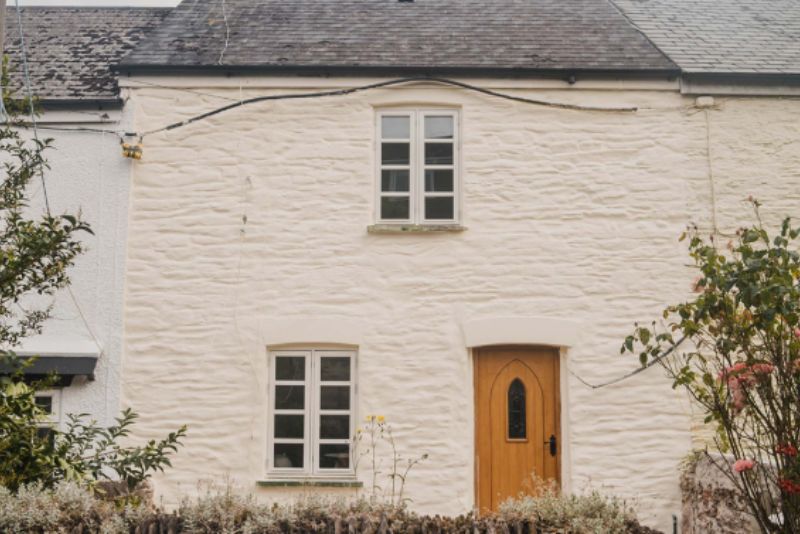Is Resin Driveways Cheaper Than Block Paving
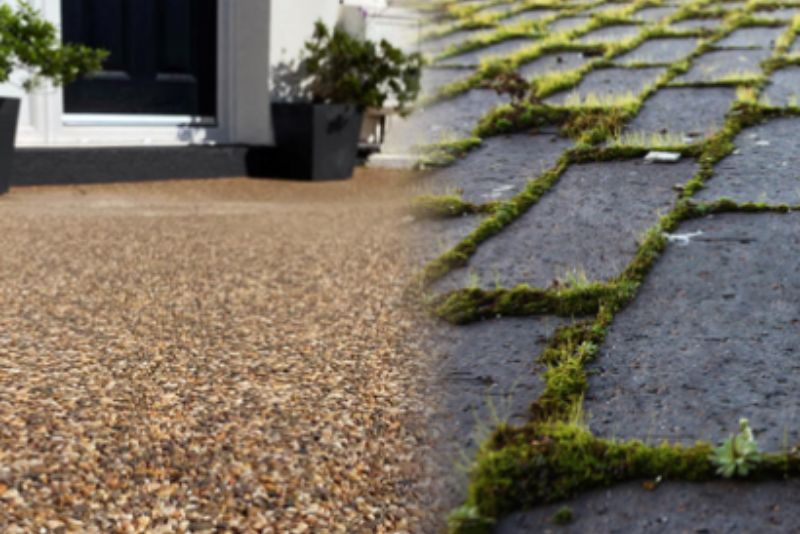
Considering upgrading your driveway but unsure whether to choose resin driveways or block paving?
This article explores the key differences between these two popular options, including material, installation process, maintenance, durability, and aesthetics.
We also highlight the benefits of each, such as easy maintenance, long-lasting durability, and versatile design options.
Comparing the costs of resin driveways and block paving, we consider factors like initial installation cost, long-term maintenance expenses, and resale value.
By the end, you will have a better understanding of which option may be the best fit for your needs.
What Is A Resin Driveway?
A resin driveway is a popular surfacing option for both commercial and residential properties. It is known for its durable and low-maintenance properties, making it a preferred choice for many property owners.
Resin driveways are composed of a mixture of resin and aggregates, providing a strong and long-lasting surface that can withstand heavy traffic and harsh weather conditions. One of the key advantages of resin driveways is their seamless finish, creating a sleek and modern look that enhances the aesthetic appeal of any property.
These driveways are available in a variety of colors and finishes, offering customization options to suit different design preferences. Along with their durability, resin driveways require minimal maintenance, typically only needing occasional cleaning to keep them looking pristine.
Both in commercial settings, such as office complexes or retail spaces, and in residential homes, resin driveways are favored for their ability to transform the appearance of driveways, pathways, and outdoor spaces with a durable and visually appealing solution.
Check out: How To Clean A Resin Bonded Driveway
What Is Block Paving?
Block paving is a surfacing method that involves laying individual bricks or blocks to create a durable and visually appealing surface.
It allows for intricate surface design patterns, providing a unique aesthetic that can elevate the overall look of residential driveways, garden paths, patios, and even commercial spaces. Block paving materials vary, including clay bricks, concrete blocks, and natural stone, each offering distinct textures, colors, and durability. The versatility of block paving lies in its ability to blend various materials to achieve different visual effects, from traditional to contemporary styles. Whether you prefer a rustic cobblestone look or a sleek modern finish, block paving can cater to diverse preferences and architectural themes.
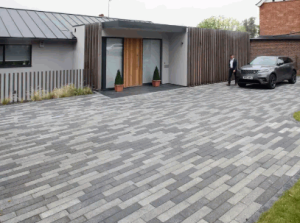
What Are The Differences Between Resin Driveways And Block Paving?
Resin driveways and block paving differ in their appearance and advantages. While resin driveways offer a sleek and modern look with easy maintenance, block paving provides a classic and customizable aesthetic with durability.
Resin driveways, often characterized by a smooth, resin-bound surface, create a seamless finish that adds a contemporary touch to any property. The low-maintenance aspect of resin driveways is a key selling point, as they are resistant to weeds and require minimal upkeep to maintain their pristine appearance.
On the other hand, block paving, constructed using individual blocks or bricks, offers a traditional yet versatile design. Homeowners can choose from various colors, patterns, and textures to customize their driveway, adding a unique charm to their outdoor space. The durability of block paving makes it ideal for areas with heavy traffic or harsh weather conditions.
Material
When comparing resin driveways and block paving in terms of materials, resin driveways typically utilize a mixture of UV-stable resins and aggregates, while block paving involves the use of individual bricks or blocks made from materials like concrete or clay.
UV-stable resins play a crucial role in resin driveways, offering durability and resistance to color fading from sunlight exposure. These resins are expertly mixed with selected aggregates to ensure a strong and long-lasting surface.
On the other hand, block paving presents a diverse range of options, with materials such as concrete and clay being popular choices. Each material brings its own unique characteristics, from the classic appeal of clay to the robustness of concrete.
Installation Process
The installation process for resin driveways involves mixing the resin and aggregate on-site before applying it to the prepared surface, while block paving requires laying each brick or block individually in a specific pattern to create the desired design.
For resin driveways, the first step typically entails preparing the base by ensuring it is level and free from debris. Once the base is ready, the resin and aggregate are carefully measured and mixed on-site to achieve the desired consistency and color. This mixture is then poured onto the surface and spread evenly using specialized tools.
On the other hand, block paving involves meticulous planning and precision. Each brick or block is laid one at a time, following a predetermined pattern such as herringbone or stretcher bond. Proper alignment and spacing are crucial to ensure a strong and visually appealing paved surface.
Maintenance
In terms of maintenance, resin driveways are relatively low-maintenance, requiring occasional cleaning and resealing, while block paving may need regular weeding, re-sanding, and sealing to maintain its appearance and structural integrity.
Resin driveways are favored for their durability and resistance to weeds and moss, cutting down on the need for frequent upkeep. The occasional cleaning with a pressure washer to remove debris and dirt, combined with resealing every few years, is typically all that is required to keep a resin driveway looking fresh.
Contrastingly, block paving demands more attention to prevent weed growth between the pavers. Regular weeding, re-sanding of the gaps to maintain stability, and sealing the surface to protect against stains and fading are vital tasks for preserving the visual appeal and structural strength of a block paving driveway.
Durability
Regarding durability, resin driveways are known for their long-lasting surfaces that resist cracking and fading, while block paving surfaces may be susceptible to shifting, weed growth, and color fading over time.
Resin driveways are often praised for their ability to withstand harsh weather conditions, heavy vehicles, and frequent usage without losing their aesthetic appeal. The secret lies in the resin material which creates a seamless and sturdy surface while maintaining its color vibrancy for years to come.
On the other hand, block paving surfaces require regular maintenance such as weeding, re-leveling, and resealing to prevent cracks and unevenness, making them less ideal for homeowners seeking a low-maintenance, long-lasting solution for their driveways.
Aesthetics
In terms of aesthetics, resin driveways offer a contemporary and smooth finish that can enhance the curb appeal of a property, while block paving provides a traditional and rustic look that suits a variety of architectural styles.
Resin driveways, with their sleek and polished appearance, portray a sense of modernity that resonates well with minimalist designs and modern architecture. The seamless finish of resin driveways creates a visually appealing surface that complements the clean lines of a contemporary property.
On the other hand, block paving exudes a timeless charm that adds character and warmth to any home. The classic texture of block paving brings a sense of history and tradition to a property, blending seamlessly with both traditional and more rustic architectural themes.
What Are The Benefits Of Resin Driveways?
Resin driveways offer several benefits, including easy maintenance, long-lasting durability, versatile design options, and cost-effectiveness compared to other surfacing materials.
One of the significant advantages of resin driveways is their minimal maintenance requirements. Unlike traditional surfaces like concrete or gravel, resin driveways are easy to care for and can be easily cleaned with just a simple sweep or hose down. This ease of maintenance not only saves time and effort but also helps keep the driveway looking aesthetically pleasing for a longer period.
Easy Maintenance
One of the key benefits of resin driveways is their easy maintenance, requiring simple cleaning and occasional resealing to keep the surface looking fresh and well-maintained.
With resin driveways, there’s no need for intensive scrubbing or specialized tools; a regular sweep and the occasional wash with soapy water are usually sufficient to maintain its aesthetics. The smooth, non-porous surface of resin driveways makes it resistant to stains, oil spills, and weed growth, minimizing the need for frequent maintenance.
Compared to traditional driveway materials like concrete or asphalt, resin driveways require less repair and patching, reducing long-term maintenance costs. The minimal upkeep and longevity of resin driveways make them a practical choice for homeowners looking for an attractive and low-maintenance option.
Long-Lasting
Resin driveways are known for their long-lasting durability, with surfaces that can withstand heavy traffic, UV exposure, and harsh weather conditions without deteriorating quickly.
One of the key advantages of resin driveways is their remarkable resilience to wear and tear. These surfaces are specifically designed to bear the weight of vehicles day in and day out, making them ideal for driveways and pathways that experience heavy traffic. Their ability to resist UV radiation ensures that they maintain their color and finish over time, unlike traditional surfaces that fade and degrade under the sun’s rays. In addition, resin driveways are highly resistant to adverse weather conditions like frost, rain, and extreme temperatures, further enhancing their longevity and durability.
Versatility In Design
Resin driveways offer a wide range of design options, including various colors, patterns, and finishes, allowing property owners to customize their driveways to suit their preferences and enhance the overall aesthetic of their homes or businesses.
One of the remarkable aspects of opting for a resin driveway is the sheer versatility it provides in terms of design. With an array of vibrant hues, intricate patterns, and luxurious finishes to choose from, homeowners can truly personalize their driveways to reflect their unique style and make a statement. Whether you prefer a bold, modern look with sleek, monochromatic tones or a more traditional feel with earthy textures and warm hues, resin driveways can accommodate a wide range of preferences.
Cost-Effective
In terms of cost-effectiveness, resin driveways offer a budget-friendly surfacing solution for both commercial and residential properties, providing a durable and visually appealing finish at a reasonable cost.
One of the key advantages of opting for resin driveways is their cost benefits. Not only do they come at an affordable price point, but they also require minimal maintenance, saving property owners money in the long run. The materials used in resin driveways are cost-effective while still offering a high-quality finish that adds value to the property. This cost-effectiveness extends to installation as well, as resin driveways can often be laid quicker and with less labor compared to traditional driveway materials, further reducing overall costs.
What Are The Benefits Of Block Paving?
Block paving offers several advantages, including strength and durability, aesthetic appeal, easy replacement of damaged sections, and eco-friendliness due to its permeable properties.
These characteristics make block paving an ideal choice for driveways, pathways, patios, and other outdoor areas that require a durable and visually pleasing surface. The strength of block paving comes from its interlocking design, which can support heavy loads without cracking or shifting. The durability of this paving option ensures long-lasting performance, minimizing the need for frequent repairs or replacement.
The visual appeal of block paving is undeniable, as it offers a wide range of colors, patterns, and textures to complement any architectural style. The ability to replace individual blocks easily means that any damaged sections can be fixed without disrupting the entire surface, saving time and money on maintenance. The permeable nature of block paving allows water to drain through the surface, reducing the risk of flooding and preserving the local environment.
Strength And Durability
Block paving is renowned for its strength and durability, providing a robust surfacing solution that can withstand heavy loads, harsh weather conditions, and the test of time without significant wear or damage.
Its ability to resist the wear and tear of daily use and external factors such as rain, frost, and UV rays sets it apart as a long-lasting choice for driveways, walkways, and patios. The interlocking design of the blocks enhances stability and prevents shifting under pressure, ensuring a solid foundation that remains intact over the years.
Aesthetics
Block paving excels in its aesthetic appeal, offering a visually pleasing surface that can enhance the overall look of properties while complementing various architectural styles and landscaping designs.
One of the key advantages of block paving lies in its versatility to adapt to different property aesthetics, be it modern, traditional, or rustic. The range of colors, patterns, and textures available allows homeowners to customize their outdoor spaces uniquely, adding character and charm to their surroundings. The neat and organized appearance of block paving creates a sense of order and sophistication, enhancing the curb appeal of any property. This type of paving not only serves a practical purpose but also serves as a design element that elevates the overall visual appeal of the property.
Easy Replacement
One of the key benefits of block paving is its easy replacement process, allowing damaged or worn-out sections to be swiftly replaced without the need for extensive repair work, ensuring the longevity and integrity of the paved surface.
This efficient replacement procedure involves carefully lifting the damaged section without disturbing the surrounding blocks. The well-designed interlocking system of block paving allows for seamless removal and replacement, maintaining the uniform and appealing look of the paved area. Once the new block is placed, it effortlessly integrates with the existing layout, ensuring a consistent and pleasing aesthetic. This swift and straightforward replacement process not only saves time and effort but also reduces overall maintenance costs, making block paving a cost-effective and durable choice for outdoor surfaces.
Environmentally Friendly
Block paving is environmentally friendly due to its permeable properties that allow water to drain through the surface and be absorbed by the ground, reducing the risk of flooding and supporting sustainable urban drainage systems (SUDS).
By facilitating the natural infiltration of rainwater, block paving helps in maintaining the groundwater levels and reducing the burden on conventional drainage systems. This eco-friendly solution not only prevents surface water runoff but also filters pollutants and sediments, enhancing water quality.
It acts as a sustainable urban drainage systems (SUDS) measure, mitigating the impact of urbanization on local water bodies.
Which Is Cheaper: Resin Driveways Or Block Paving?
When comparing the cost between resin driveways and block paving, factors such as initial installation costs, long-term maintenance requirements, and the resale value of the property should be considered to determine which option is more cost-effective in the short and long term.
Resin driveways often entail higher initial installation costs due to the specialized materials used and the level of expertise required for the process. On the other hand, block paving may come at a relatively lower initial cost but can require frequent maintenance such as weeding, re-sanding, and potential repairs due to shifting over time.
In terms of ongoing maintenance, resin driveways typically demand minimal upkeep, offering a more cost-effective solution in the long run. They are resistant to weeds and require occasional cleaning to maintain their pristine appearance. Block paving, however, requires more attention and expense over time, which could impact the overall cost-efficiency.
Regarding property resale value, resin driveways are often considered a more attractive feature by potential buyers, serving as a modern and visually appealing addition that can enhance the overall curb appeal and value of the property. Block paving, although durable, may not contribute as significantly to the aesthetic appeal of the property, potentially affecting its market value.
Factors To Consider In Cost Comparison
When comparing the costs of resin driveways and block paving, factors such as surface area, material choices, labor costs, and additional features like edging or patterns play a crucial role in determining the overall cost-effectiveness of each surfacing option.
Surface area is a significant consideration as larger areas will naturally require more material and labor, increasing the overall cost. The choice of materials also heavily influences the cost comparison, with resin driveways typically being more expensive due to the specialized resin used. Labor costs can vary depending on the complexity of installation, with intricate designs or patterns adding to the overall expenses. Design elements such as decorative borders or colored aggregates can enhance the aesthetic appeal but also contribute to higher costs. Understanding these key factors is essential for making an informed decision when selecting between resin driveways and block paving.
Initial Installation Cost
The initial installation cost of resin driveways and block paving can vary based on factors such as material quality, labor charges, and surface preparation requirements, making it essential to compare quotes from reputable installers to determine the most cost-effective solution for your property.
Material quality plays a crucial role in determining the overall durability and aesthetic appeal of your driveway or paving. Opting for high-quality materials may come with a higher upfront cost but can save you expenses in the long run through reduced maintenance and longevity. Labor charges are another significant component of installation costs, as skilled workers will ensure a professional finish and efficient completion of the project. Proper site preparation, including excavation, drainage considerations, and base compaction, is vital for a stable and long-lasting installation.
When evaluating cost estimates, pay attention to itemized breakdowns that detail material quantities, labor hours, equipment rentals, and any additional services included. Look for warranties on materials and workmanship, as they can provide you with confidence in the longevity of your investment. Consider requesting references from past customers or visiting completed projects to assess the quality of workmanship before making a decision.
Long-Term Maintenance Cost
When evaluating the long-term maintenance costs of resin driveways and block paving, considerations such as cleaning requirements, repair expenses, and the frequency of resealing or re-sanding should be factored in to determine the overall cost-effectiveness of each surfacing option over time.
An essential aspect to bear in mind is that resin driveways generally require minimal maintenance compared to block paving, which often necessitates frequent cleaning to prevent weed growth and ensure a neat appearance.
Block paving may incur higher repair costs over time due to the potential shifting or sinking of individual blocks, demanding more extensive and costly repairs than the occasional resealing or re-sanding needed for resin driveways.
Considering these factors, it becomes evident that the long-term durability and maintenance requirements play a significant role in determining the total cost of ownership for both resin driveways and block paving.
Resale Value
The impact of resin driveways and block paving on the resale value of a property should be considered, as the visual appeal, durability, and maintenance requirements of the driveway surface can influence potential buyers’ perceptions and the overall market value of the property.
Regarding attracting buyers, curb appeal plays a crucial role in creating a lasting first impression. Resin driveways and block paving, with their sleek and modern designs, can significantly enhance the exterior aesthetics of a property. This visual upgrade can immediately capture the attention of interested buyers, making the property stand out in the competitive real estate market. The durability of resin driveways and block paving adds to their appeal, as buyers are often attracted to low-maintenance features that offer long-term cost savings.
Which Is Better: Resin Driveways Or Block Paving?
Determining whether resin driveways or block paving is better depends on factors such as personal preferences, property aesthetics, maintenance preferences, budget considerations, and the desired longevity and durability of the driveway surface, as both options offer distinct advantages based on individual needs and priorities.
Resin driveways are known for their smooth, modern finish that can enhance the visual appeal of a property with a sleek and contemporary look. On the other hand, block paving provides a more traditional and versatile design option, allowing for various patterns and color combinations to complement different architectural styles.
Regarding maintenance, resin driveways typically require less upkeep compared to block paving, as they are resistant to weeds and algae growth, making them easier to clean and maintain over time. Block paving offers the advantage of easy repair and replacement of individual blocks if damage occurs.
In terms of cost, resin driveways tend to be more expensive upfront but may result in long-term savings due to their durability and minimal maintenance requirements, while block paving offers a more cost-effective initial installation but may incur higher maintenance costs over time.
Ultimately, the decision between resin driveways and block paving comes down to personal preferences, budget considerations, desired aesthetics, and maintenance expectations, as both options have unique strengths that can cater to different needs and preferences.
